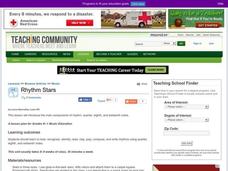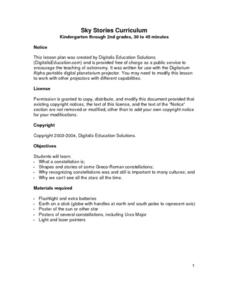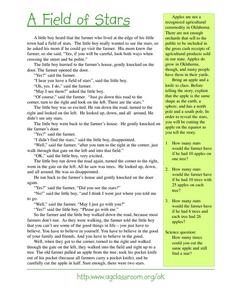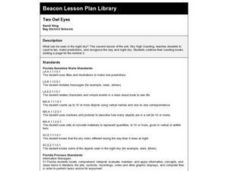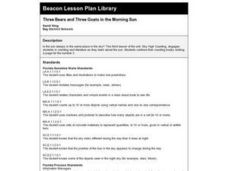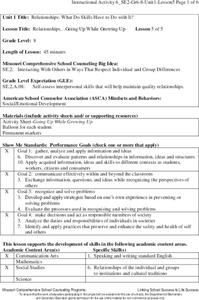Aquarium of the Pacific
Lego Molecules
Young scientists construct an understanding of molecular compounds in this hands-on science lesson. Using LEGO® to model the atoms of different elements, students build molecules based on the chemical formulas of common compounds.
Curated OER
Understanding the Cosmic Microwave Background (CMB)
How did our universe really begin? Explore the Science Big Bang Theory and Cosmic Microwave Background (CMB) with this multiple activity-based lesson that demonstrates that the increase of density due to the decrease of temperatures,...
Curated OER
Shooting Basketball Stars
Lessons that have a little competition built into the skills drills because it helps the players focus more on what they should be practicing. Players practice lay-ups, mid-distance shots and long-range shots. They collect stars of...
Curated OER
STAR Deputies, Unite!
Second graders work in small groups to brainstorm solutions to safety situations. They use the STAR safety model worksheets and role play as STAR deputies. Based on the scenario presented on the worksheet, they develop skits that show a...
Library of Congress
Stars, Stripes and Symbols of America: Comparing Our Flag, Past and Present
Your young historians will compare and contrast the details of the American flag today with an an image of the nation's flag from the post-Civil War era, and identify the flag's importance as a national symbol through analysis worksheets...
Missouri Department of Elementary
What Are Bullying and Harassment? Part 2
After reviewing notes from the previous lessons, small groups obtain a scenario card that describes a situation in which bullying is happening. Peers discuss the event and brainstorm two solutions using the STAR method then present their...
NASA
Discovering Some of Your “Yardsticks” Are Actually “Meter-sticks”
The Milky Way gets great reviews on Trip Advisor — 100 million stars. The activity allows scholars to rethink their assumptions and prior knowledge. Pupils observe a set of two lights at equal distance and brightness, but they believe...
media.yurisnight.net
Science Lesson Plan: Our Solar System: I Wonder?
Ever wonder why Pluto isn't considered a planet? Or how large the Earth is compared to the other inner planets? Explore the universe with a series of projects that simulate different aspects of our solar system. The activities require...
Curated OER
Rhythm Stars
Students listen, clap, compose and identify various rhythms. In this rhythm lesson, students practice rhythm with rhythm cards. Students become familiar with stick notation. Students glue Popsicle sticks to illustrate rhythms.
Curated OER
Sky Stories
Students are introduced to the branch of science known as astronomy. They discuss stars and constellations and then view the night sky using a portable digital planetarium projector. They identify a variety of constellations and...
Curated OER
Stellar Navigation
Middle schoolers are introduced to the concept of stellar navigation. Inside a portable digital planetarium they identify various stars that were used as a navigational tool. They go through several activities in which they attempt to...
Curated OER
Number the Stars, by Lois Lowry. New York: Dell 1990
Students recognize courage and heroism of Danish and Swedish people and all others who resisted the Nazis, realize that everyone has the capacity to do good as well as evil, and analyze reasons and motivations that caused certain people...
Curated OER
Stars and Stripes Forever: Flag Facts for Flag Day
Students are introduced to the symbolism of the flag of the United States of American. They identify flag components, history, etiquette and lore. They also use constrution paper to make a flag and discuss the Pledge of Allegiance.
Curated OER
My Life as a Star!
Students research the life cycle of a star and present their finding to the class.
Curated OER
A Field of Stars
Students discover the earth can be compared to the shape of an apple, having a spherical shape, and has a north and south pole. They listen to the story, "A Field of Stars" and then observe as the apple is cut open on the equator to...
Curated OER
Two Owl Eyes
First graders listen to the story, Olivia Counts, and demonstrate counting to ten. They make predictions, and recognize the day and night sky. They add page number 2 to their counting books.
Curated OER
Three Bears and Three Goats in the Morning Sun
First graders listen to the story Three Bears from the book, Three Tales of Three, focusing on the one-to-one correspondence while counting various items in the story. They create pages for the number 3 for their counting books.
Curated OER
How Hot and How Big?
Young scholars explore star color and size. In this space science lesson, students conduct various inquiry activities to explore how the color of a star affects the amount of heat produced. They also investigate how the color of stars...
Missouri Department of Elementary
Talk it Over and Work It Out: Compromise!
Stop, Think, Act, Review! Scholars use the STAR method to role play two conflict resolution scenarios about childhood problems such as jealousy or cheating. Then, the larger group judges each case to determine if the compromise is a...
Classics for Kids
"Mars" from The Planets
Gustav Holst's The Planets provide young musicians an opportunity to examine how composers can create a suite: a collection of smaller pieces grouped to explore a single topic. After listening to "Jupiter," they examine "Mars" in detail,...
University of Southern California
Deconstructing Genocide: The Ultimate Crime Against Humanity
There are eight stages of an atrocity known as genocide, and it's important to understand how they are represented so we can fight against it in the future. As young historians watch video clips of ten Jewish Holocaust survivors'...
Missouri Department of Elementary
Relationships…Going Up While Growing Up
The final lesson in a series of five that focus on developing the interpersonal skills required to develop and maintain positive relationships asks class members to identify their best friend-making skill. Individuals share these claims...
University of Colorado
The Jovian Basketball Hoop
Can you listen to Jupiter on a simple radio? Turns out the answer is yes! The resource instructs scholars to build a simple radio to pick up the radio waves created when the charged particles from the sun hit Jupiter's magnetic...
NASA
Supernova Chemistry
By measuring the wavelength, frequency, and intensity of electromagnetic radiation, scientists determine the temperature, density, and composition of far away items. Scholars rotate through ten lab stations using a spectroscope at each...










